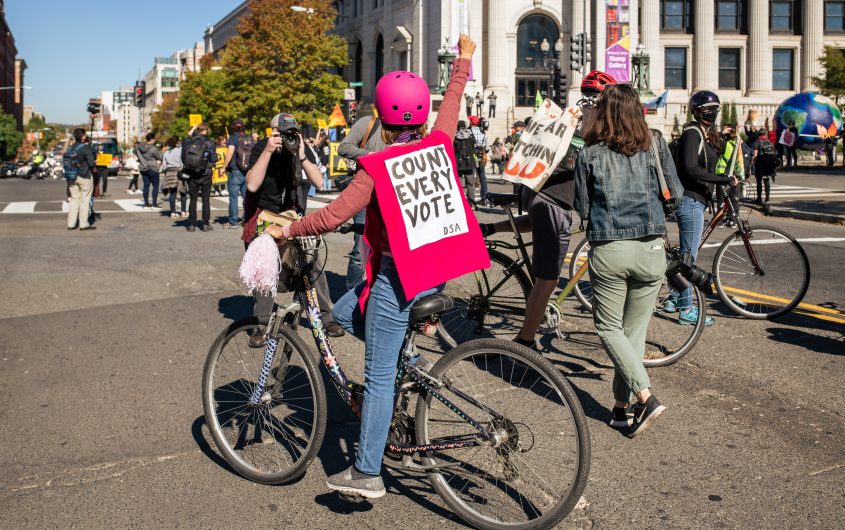
Geoff Livingston via Flickr
The 2020 U.S. Elections: Initial Reactions

Eric Langenbacher
Senior Fellow; Director, Society, Culture & Politics Program
Dr. Eric Langenbacher is a Senior Fellow and Director of the Society, Culture & Politics Program at AICGS.
Dr. Langenbacher studied in Canada before completing his PhD in Georgetown University’s Government Department in 2002. His research interests include collective memory, political culture, and electoral politics in Germany and Europe. Recent publications include the edited volumes Twilight of the Merkel Era: Power and Politics in Germany after the 2017 Bundestag Election (2019), The Merkel Republic: The 2013 Bundestag Election and its Consequences (2015), Dynamics of Memory and Identity in Contemporary Europe (co-edited with Ruth Wittlinger and Bill Niven, 2013), Power and the Past: Collective Memory and International Relations (co-edited with Yossi Shain, 2010), and From the Bonn to the Berlin Republic: Germany at the Twentieth Anniversary of Unification (co-edited with Jeffrey J. Anderson, 2010). With David Conradt, he is also the author of The German Polity, 10th and 11th edition (2013, 2017).
Dr. Langenbacher remains affiliated with Georgetown University as Teaching Professor and Director of the Honors Program in the Department of Government. He has also taught at George Washington University, Washington College, The University of Navarre, and the Universidad Nacional de General San Martin in Buenos Aires, Argentina, and has given talks across the world. He was selected Faculty Member of the Year by the School of Foreign Service in 2009 and was awarded a Fulbright grant in 1999-2000 and the Hopper Memorial Fellowship at Georgetown in 2000-2001. Since 2005, he has also been Managing Editor of German Politics and Society, which is housed in Georgetown’s BMW Center for German and European Studies. Dr. Langenbacher has also planned and run dozens of short programs for groups from abroad, as well as for the U.S. Departments of State and Defense on a variety of topics pertaining to American and comparative politics, business, culture, and public policy.
__
With the 2020 U.S. presidential election now called for Joe Biden, the world has witnessed the inner strength of a democratic system: the ability to self-correct, alter course, and peacefully change leaders. After the 2016 election saw the national popular voter loser winning the electoral college, 2020 saw the re-validation of majority rule with the winner, President-elect Biden, gaining almost 5 million more votes than the incumbent (3 percent more as of writing, with many votes still to be counted in states like California).
The message this sends to the world and to many Americans is relief. I think we will also see the return of consistency, predictability, traditional American values (for good or ill), and rules-based domestic and international policies. However, despite a day of jubilation when the election was called on November 7, a sense of joy—at home or abroad—has been surprisingly absent. This contrasts considerably to Barack Obama’s first victory in 2008.
Despite a day of jubilation when the election was called on November 7, a sense of joy—at home or abroad—has been surprisingly absent.
The mood was certainly impacted by Trump’s lead on election day, with the slow but steady counting of mailed ballots eroding his advantage in states like Pennsylvania and Georgia. The four days of counting before the projection of Biden’s victory was excruciating for millions of voters. Of course, we are in the midst of the worst global pandemic for a century, and many are simply exhausted after four years of daily scandals and incessant tweeting. Moreover, Biden is not a charismatic politician who elicits passion—indeed, his avuncular and calm demeanor was one of his greatest strengths this election cycle.
Nevertheless, the joylessness of the moment is also because of the closeness of the result. Similar to 2016, 100,000 votes or so (out of almost 150 million cast, .001 percent) in a handful of states would have changed the result. (The final margins might be a little higher once all the votes are counted, but still). Trump actually increased his support, gaining over 71 million votes. Even after two hotly contested run-offs in Georgia in January, Republicans will likely retain control of the Senate. Nancy Pelosi’s majority in the House is diminished. All of this means that legislative gridlock is likely and Senator Mitch McConnell will continue to thwart a Democratic agenda. Certainly, the hopes for deep, systemic reform are diminished.
This was not the repudiation of Trump and Trumpism that many had expected and for which many more had fervently hoped.
In sum, this was not the repudiation of Trump and Trumpism that many had expected and for which many more had fervently hoped. Despite much inflammatory rhetoric and policies, he actually increased support, for example, with Latinos from about 30 percent in 2016 to 33 percent in 2020—including about 36 percent of Latino men. Some heavily Hispanic regions like the Rio Grande valley in Texas and Miami-Dade County in Florida moved markedly toward him and fellow Republicans. Does this mean Trumpism—a right-populist polarizing combination of inflammatory rhetoric, machismo, anti-elitism, economic protectionism, unilateralism, chauvinism, and cronyism—is here to stay?
Some would say that it was always here. Perhaps we need to remember the John Birch Society. Or Ross Perot in 1992; Newt Gingrich in 1994; and the founding of Fox News by Rupert Murdoch and Roger Ailes in 1996. What about Sarah Palin in 2008? The Tea Party? Before Trump, however, there was no real leader with the ability to validate, channel, and mobilize such sentiment. Alternatively, “establishment” Republicans were better able to manage and control this energy.
The open question going forward is if Trump will continue to play this leadership role out of office. There is indeed intense speculation about his future plans—perhaps forming his own media company; perhaps running again in 2024 when he would be 78 years old. He might be too busy paying back debt, managing his ailing company, or defending himself from various lawsuits and prosecutions that have been issued or hinted at. His message will most certainly continue to resonate. The right-wing media infrastructure is formidable and will continue to amplify these sentiments—not just Fox, but Breitbart, InfoWars, One America News Network, The Daily Caller, talk radio, social media, etc. Indeed, in the days after the election all of these outlets have been pushing his claim of fraudulent voting—Stop the Steal.
Perhaps the biggest question of them all is what other Republicans will do and say.
But, perhaps the biggest question of them all is what other Republicans will do and say. Will they continue to actively or passively support Trump and Trumpism? Will they continue a scorched earth obstructionist course in Congress? If so, they might not even confirm Biden’s cabinet selections, let alone federal judges. I fear this is the likely course because many Republicans feel that it was a successful strategy against Obama and they did not pay an electoral price given the results of the 2016, 2018, and 2020 elections. Despite unprecedented criticism, mobilization, and fundraising, Trump enablers like Mitch McConnell, Lindsay Graham, Susan Collins, and many others were handily re-elected. But, who knows, maybe these powers on Capitol Hill will have a change of heart and understand how vital it is to cooperate in a bipartisan manner to get needed legislation passed and to reform many aspects of our sclerotic political institutions and electoral processes. This is unlikely, though, given their track records. In fact, they are supporting Trump’s post-election rhetoric about fraudulent voting despite the almost complete lack of evidence.
On a final note, I have spoken to colleagues and friends from around the world—Germany, Spain, Argentina, the UK, Canada—over the last week. Everyone had followed the results almost as closely as American voters. Besides a sense of relief that a version of normalcy will return—yet most realize that it will not be the status quo ante—the most common reaction is to observe that the U.S. political system is broken. The most productive and necessary task is to start the arduous process of fixing and restoring the basic legitimacy of the U.S. political system, which will not only benefit all Americans, but will help us to regain admiration abroad.







